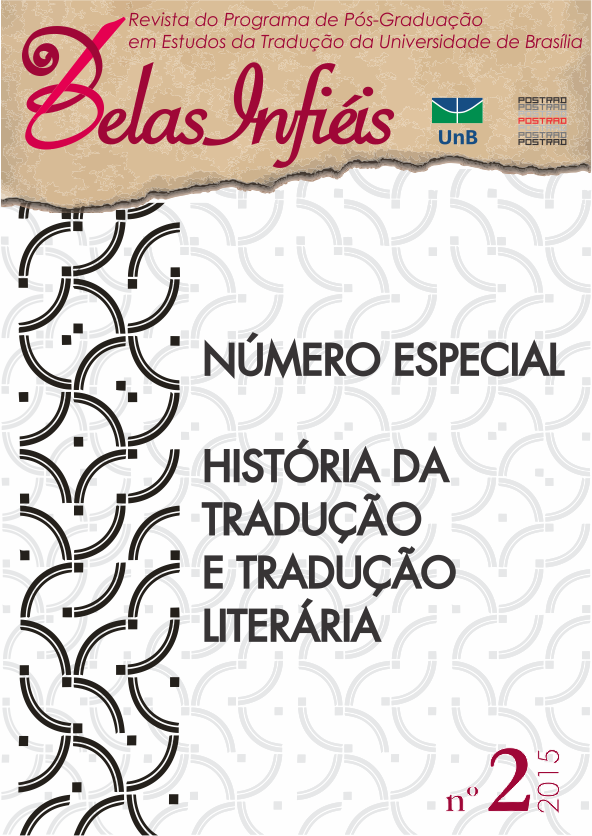ENTRE O NACIONAL E O ESTRANGEIRO:
DIÁLOGOS DE FORMAÇÃO DA IDENTIDADE BRASILEIRA
DOI :
https://doi.org/10.26512/belasinfieis.v4.n2.2015.11335Mots-clés :
Romantismo, Modernidade, Nacional, Estrangeiro, TraduçãoRésumé
Este artigo tem como objetivo examinar a relação entre o nacional e o estrangeiro em dois períodos determinantes na formação da identidade brasileira, o romantismo e a modernidade, compreendendo-se aqui por tal o período entre a Semana de 22 e o movimento concretista. Ao lado disso, analisa-se como durante a modernidade a tradução é tomada como forma privilegiada de estabelecer contato com o estrangeiro, por meio da atividade do tradutor/devorador, capaz de realizar um diálogo que foge à s convenções impostas de fora. Para isso, analisam-se os textos “Bosquejo da poesia brasileira” (1841) e “Introdução sobre a literatura nacional” (1844), de Joaquim Norberto de Sousa e Silva, e os ensaios “Poesia e modernidade” (1984) e “Da razão antropofágica” (1980), de Haroldo de Campos, em que ambos, à sua maneira, buscam elaborar uma tradição própria, ao mesmo tempo em que dialogam com o estrangeiro. Constata-se que ambos almejam uma tradição que responda pelo nacional e que possa mediar a relação com o outro.
Téléchargements
Références
ASSIS, Machado. Notícia da atual literatura brasileira. Instinto de nacionalidade. In: ______. Obra completa. Rio de Janeiro: Nova Aguilar, v. 3, 1994, p. 801-809.
CAMPOS, Haroldo de. “Poesia e modernidade: Da morte do verso à constelação. O poema pós-utópico”. In: ______. O arco-íris branco: ensaios de literatura e cultura. Rio de Janeiro: Imago, 1997, p.243-270.
______. “Da razão antropofágica: diálogo e diferença na cultura brasileira”. In: Metalinguagem e outras metas:ensaios de teoria e crítica literária. São Paulo: Perspectiva, 2010, p. 231-255.
CANDIDO, Antonio. Formação da Literatura Brasileira: momentos decisivos. Belo Horizonte: Itatiaia, 1997, v. 1, 382 p.
GARRETT, Almeida. “Parnaso lusitano”. In: ZILBERMAN, Regina; MOREIRA, Maria Eunice (Orgs.). O berço do cânone. Porto Alegre: Mercado Aberto, 1998, p. 17-73.
LINHARES, Temístocles. História crítica do romance brasileiro:1728-1981. Belo Horizonte: Itatiaia; São Paulo: Universidade de São Paulo, 1987, v. 1, 528 p.
MOREIRA, Maria Eunice. Na rede do tempo: História da Literatura e fontes primárias ”“a contribuição de Joaquim Norberto”–. In: ZILBERMAN, Regina; MOREIRA, Maria Eunice; BORDINI, Maria da Glória; REMÉDIOS, Maria Luiza Ritzel. As pedras do arco: fontes primárias, teoria e história da literatura. Belo Horizonte: UFMG, 2004. p. 119-198.
SILVA, Joaquim Norberto de Sousa e. Modulações poéticas. In: ZILBERMAN, Regina; MOREIRA, Maria Eunice (Orgs.). O berço do cânone. Porto Alegre: Mercado Aberto, 1998, p. 89-142.
SILVA, Joaquim Norberto de Sousa; ADET, Emílio. Mosaico poético. In: ZILBERMAN, Regina; MOREIRA, Maria Eunice (Orgs.). O berço do cânone. Porto Alegre: Mercado Aberto, 1998, p. 183-207.
ZILBERMAN, Regina. “De sabiás e rouxinóis: o diálogo Brasil-Portugal na nascente historiografia da Literatura Brasileira”. In: NUÑEZ, Carlinda Fragale Pate; SALES, Germana; RODRIGUES, Raues Ribeiro; SOUZA, Roberto Acízelo de; BARBOSA, Socorro de Fátima Pacífico (Orgs.). História da literatura:fundamentos conceituais. Rio de Janeiro: Makunaima, 2012, p. 204-230.
Téléchargements
Publié-e
Comment citer
Numéro
Rubrique
Licence
Copyright Statement
Given the public access to this journal, the texts are free to use but requires the recognition of the original authorship and initial publication in this journal to be properly stated.
The journal allows the use of works published for non-commercial purposes, including the right to submit the work to publicly accessible databases. Published contributions are the sole and exclusive responsibility of the author(s).
- When submitting papers to be evaluated by the Belas Infiéis journal, the author(s):
- Declare that the contents of the contributions are original and of their original creation, being entirely responsible for their content if there is an objection by third parties.
- Claim to be aware that they should not commit academic plagiarism.
- Declare that the manuscript has not been published, completely or partially, in Portuguese or another language. If it is a translation it should be submitted to the Translated Articles section.
- Declare that the manuscript is not being evaluated by other journals.
- Declare that the manuscript was not submitted to another journal simultaneously.
- Commit(s) to inform the journal of any kind of error or inaccuracy in their contribution (published, in evaluation or in editing) and to collaborate with the editors to make due corrections of the article (when in evaluation or editing) or erratum/retraction (after publication).
- Declare that there is no conflict of interest regarding the published work.
- Authorize its release if it is accepted for publication without any kind of monetary compensation.
- Agree to assign non-exclusive rights to publication to the magazine, remaining free to make their contribution available in other media as long as the publication of the first version in Belas Infiéis magazine is mentioned. They also authorize Belas Infiéis to assign their texts for reproduction in content indexers, virtual libraries and similar platforms.
- Maintain copyright and grant the journal the right of first publication, the work being licensed under theCreative Commons Attribution License.
- Is/Are allowed and encouraged to publish and distribute their work online after the editorial process, which may increase the impact and citation of the published work.
- Authorize the editorial team to make textual adjustments and to adapt the article to the publication rules, when necessary.



















